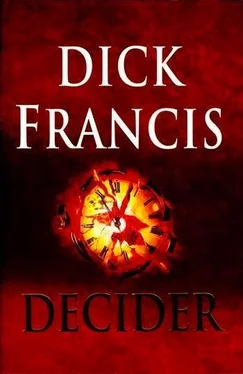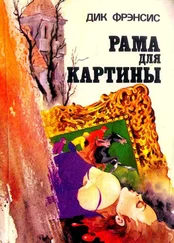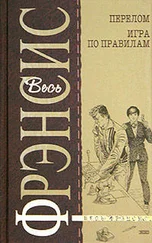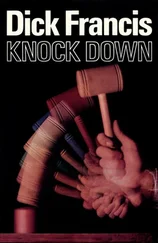Dart turned away and Mrs Chinchee retreated towards her upstairs tasks, any awkward curiosity well neutralised.
‘Right,’ Dart said. ‘Now what? I’m not going off to that meeting. You might need me here.’
‘OK,’ I said, vaguely relieved. ‘Now you go out to your car, and if either of your parents should come back sooner than we expect from the meeting, you put your palm on the horn and you give five or six urgent blasts to warn me.’
‘You mean... I’m just a look-out?’
‘If your parents come back, blow the horn, then tell them you’ve lent me the phone, or the bathroom, or something.’
‘I don’t like it,’ he frowned. ‘Suppose they find you looking at the plans?’
‘You didn’t mind before. You encouraged me, in fact.’
He sighed. ‘Yes, I did. I didn’t know you so well, then, or care. Look, don’t be too long.’
‘No.’
Still hesitantly he turned away and went back towards the rear door, and I went on into Conrad’s private room where horse pictures crowded the walls and endless shiny bric-à-brac suggested a magpie disposition. Miniature silver horses, antique gold coins on a tray, a tiny gold hunting scene; every surface held treasures.
Without wasting time, I skirted the large cluttered desk and attended to the illegal act of picking someone else’s lock, the keyhole fortunately living up to the promise of easy access. The small flat tool I’d brought with me slid obligingly past the ward that guarded the simple works and moved the tongue back from the socket. For picking simple locks, any flat filed-down narrow version of an ordinary key will do the job; the simpler, the better.
The panelled door, so like the walls, pushed easily open, revealing a cupboard large enough to walk into. Leaving the walking stick lying on the desk I limped into the cupboard and pressed a light switch I found there, activating an overhead bulb in a simple shade.
Inside, the walls were lined throughout by shelves, on which stood endless boxes, all of different sizes, colours and shapes, and all unhelpfully unlabelled.
The drawings for the proposed new stands were in clear view, the large folder that Conrad and Wilson Yarrow had taken to Roger’s office standing on the floor, leaning against one of the shelf-walls. Untying the pink tape bow that held the folder shut, I took out the drawings, laying them flat, outside, on Conrad’s desk.
They were, I had to confess, a sort of window-dressing in case Dart came to find me, as the drawings were those I had already seen, without any additions.
The chief object of my risky enterprise had been to try to find the packet that Perdita had said William, Lord Stratton, third baron, had intended to entrust to Conrad, fourth baron; the packet containing enough dirt on Keith to keep him controlled. If I could but find it, I thought, I could use it perhaps to preserve my own life, promising for instance that if I should die violently, the packet’s contents would become public knowledge inexorably.
Faced with the actual array of random containers, I had to re-think. Finding any particular packet in those could take hours, not minutes, particularly as I’d been given no clear description of what sort of packet I was looking for.
I took the lid off a box straight ahead. The box was the size of a large shoe box, made of stiff decorative cardboard in a mottled maroon colour; the sort of box my mother had stored photographs in.
This box held no photographs and no mysterious packets, but only mementoes of social events to do with the hunt of which Conrad was joint master; stiff gilt-edged invitations, menus, order of speeches. A longer box next to it held dozens of loose clippings from newspapers and magazines, all showing either future hunting programmes or accounts of past sport.
Box after box contained the same sort of thing: Conrad was not so much secretive, as Dart had described him, as a compulsive collector of the minutiae of his life, far outdoing Carteret’s diaries or my balance-sheet memories as a proof of existence.
I tried to think my way into Conrad’s mind, to imagine just where he would have stowed the most sensitive knowledge: and baulked at wondering if I should simply be searching his desk or the bookshelves. If the packet’s existence had been enough to worry William Stratton into passing it on, Conrad wouldn’t leave it anywhere where an unsuspecting person could open it accidentally. Given the hidden cupboard, for all that its lock was child’s play, Conrad would use it.
I hurried along the rows, tipping open the lids, turning over reams of irrelevant papers, finding nothing worth the risk. It was in an ordinary shoe box that I finally came across a gem that I’d been hoping for, though not the ultimate jackpot.
I found myself looking at a black and white glossy photograph of Rebecca: not by any means a portrait, but a picture of her in ordinary clothes, not jockey’s colours, holding out her hand and receiving a wad of what looked like banknotes from a man whose back was to the camera, but who wore a trilby hat with hair curling from beneath the brim and a jacket cut from a distinctive check cloth. The background, a shade out of focus, was nevertheless identifiable as a racecourse.
I turned the photograph over: no notes, no provenance, nothing.
In the same box, where the photograph had been lying, lay a recording tape. Apart from those two objects, the box was empty.
The tape, ordinary looking, bore no information as to what it carried.
Even without believing in extra-sensory perception, I felt an unusual frisson over the juxtaposition of photograph and tape, and their sole occupancy of a box. I took them out and put them on Conrad’s desk, meaning to look around for a tape-recorder; but meanwhile I returned to the cupboard, still obstinately seeking a packet that was quite likely not there to be found.
Old out-of-date lists of hounds. Years old estate accounts. Boxes packed with Dart’s school reports. On the maxim thieves work by, that everyone hides valuable things at the bottom of drawers, and that the quickest way of finding profit is to empty the drawer out onto the floor, I began, not emptying exactly, but tipping up all the contents to look at the bottom-most in each box, and it was by doing that that I finally came across an ordinary brown envelope with the single word ‘Conrad’ written on it.
I drew it out from under a pile of similar envelopes holding ancient insurance policies, long out of date. The ‘Conrad’ envelope had been slit open. I looked inside without excitement, having by then concluded I’d been clutching at straws, that anything of critical importance would be somewhere else after all. Sighing, I drew out a single sheet of paper with a short note handwritten on it. It said:
Conrad
This is the envelope I told you of. Take care with it.
Knowledge is dangerous.
S.
I looked into the brown envelope further. Inside it lay another brown envelope, this one smaller and unopened, but fatter, with more sheets than one or two inside.
Either it was what I was looking for, or it wasn’t. In either case, I was taking it with me, and so as to conceal my pilfering even from Dart, I hid the outer envelope, with letter and unopened envelope inside it, in my clothes: in, to be exact, my close-fitting underpants, against the skin of my abdomen.
Looking round to make sure that all the boxes were closed and appeared undisturbed, I went out to Conrad’s desk to put the grandstand plans back in their folder, to prop them where they had been, to relock the cupboard door and beat an undiscovered retreat.
The photograph of Rebecca and the tape lay on top of the plans. Frowning, I unzipped my trousers again and put the photograph face down against my stomach, where the glossy surface stuck to me, the brown envelope outside it, both of them held snugly, too large and flat to slide out down my legs.
Читать дальше




